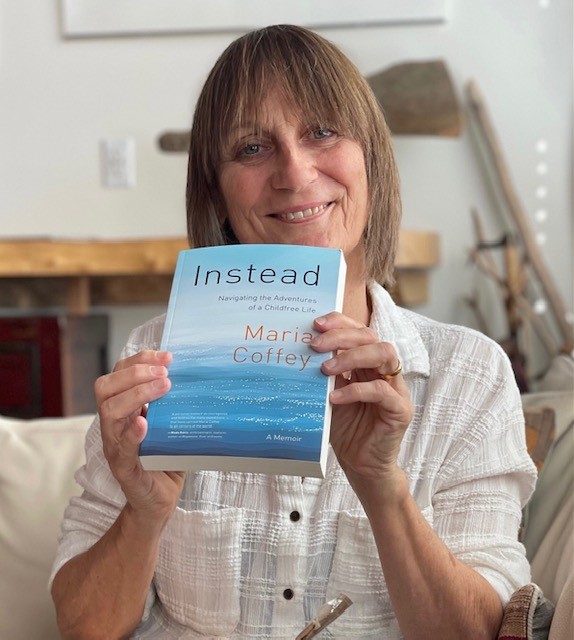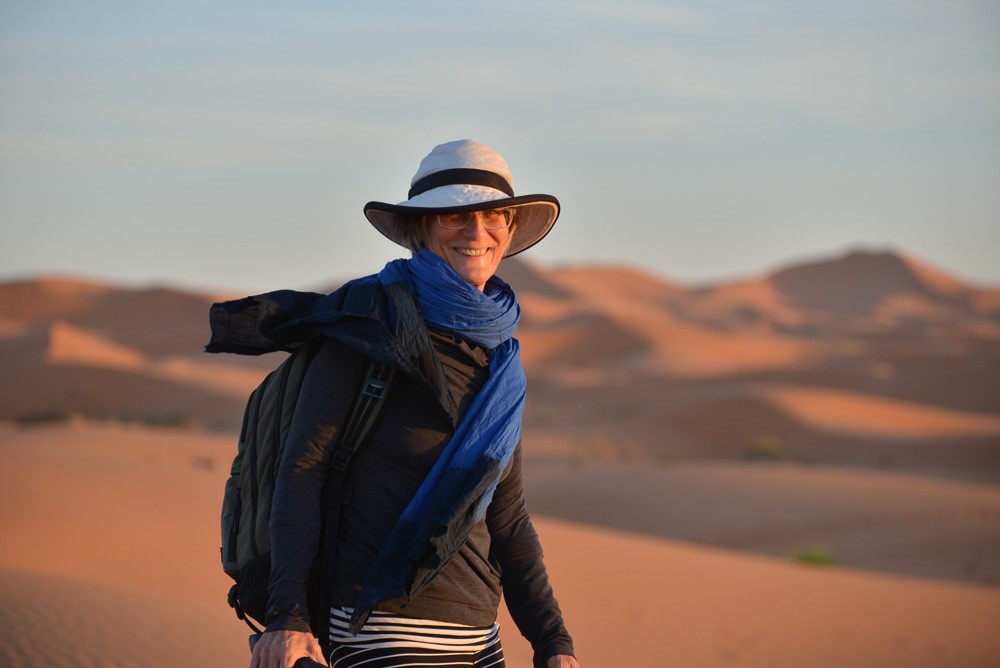
By Maria Coffey
In 2019, I applied to the Banff Centre’s Mountain Wilderness and Writing program (MWW), calling myself a ‘re-emerging writer.’ It had been eleven years since my last book was published. I hadn’t intended to take such a long break, but I got caught up in a whirlwind of travelling, guiding and elephant conservation work. Then, quite suddenly, I needed to write again. MWW offered me the support and space to reconnect with what, for almost 20 years and 12 books, had been an important part of my identity.
I settled into a Leighton Artists Studio on the Banff Centre campus and got started on a memoir about ageing – something that until recently I had been blissfully ignoring. I wanted to examine past experiences to see if they could help me move into a future that felt like unknown territory. I began with the story of being caught in a rip tide when I was twenty-one, and what I had learned from that near drowning experience. The rip tide was to be the metaphor for the book.
As the work progressed, in every chapter I found myself writing about my decision to not have kids. For me it had been a key factor in the unconventional, adventurous lifestyle I’d created with my husband Dag – who initially wanted a family. Choosing to be childfree , I realized, was a big story in my life, one I felt compelled to write about.
With this new focus, the memoir took me to some hard places I hadn’t expected to go: the emotional battles with my mother; my brief, tumultuous years with the mountaineer Joe Tasker; my deep rooted fear of loss. Nor could I have foreseen the frightening events that occurred as I was in the midst of writing. But it was also a joyful process, relating the unfolding of my relationship with Dag, our madcap journeys, our shared passion for the wild world and the encounters we had in its far corners. As the book took shape it became, in the words of one reviewer, ‘a story about love in its many different forms.’ And finally I arrived back at the question I had started with.
Instead: Navigating the Adventures of a Childfree Life is now published, and taking on a life of its own. Maria shared stories from her book, in-person at the 2023 Festival in Banff.
Enjoy the excerpt below!
Maria Coffey is an internationally published author of twelve previous books, which have received a number of accolades. Fragile Edge: Loss on Everest, won two prizes in Italy including the 2002 ITAS Prize for Mountain Literature; Where the Mountain Casts its Shadow won the Banff Mountain Film Festival Literature Prize in 2003 and a National Book Award in 2004. For these titles, along with Explorers of the Infinite (2008,) Maria was awarded the 2009 American Alpine Club H. Adams Carter Literary Award. Maria has also written extensively about her worldwide travels and expeditions with her husband Dag Goering, who is a veterinarian and photographer. They founded a boutique adventure travel company, Hidden Places, and its conservation branch Adventures for a Cause, raising funds and awareness for endangered species. Maria and Dag are based in British Columbia and in Catalonia.

We were stuck on a tiny desert islet, in Mexico’s Sea of Cortez. The Baja California Peninsula, and the airport where we soon had a flight to catch, were just a few miles away. But for three days and two nights the notorious El Norte wind had been blowing full blast, churning the sea into a dangerous mess of eight-foot breaking waves. There wasn’t a scrap of shade, the sky was cloudless and the sun beat relentlessly on our tent. Inside it, we slowly baked, listening to the maddening buffeting of the fabric walls, watching the poles bend with each strong gust. When we ventured outside, windblown sand filled our ears, scoured our skin and half blinded us.
Dag kept telling me not to worry. “We’ll make a break as soon as we can. And if we miss our flight, so what?”
Grimly, I reminded him that we were low on water. And, as our kayak trip to a uninhabited group of islands had lasted longer than planned because of strong winds, we were almost out of food. All we had left was a bag of currents, a cup of rice and some powdered milk.
“Oh, that.” He ducked out to check on our folding kayak, which he’d tethered to a sturdy, tree-like Saguaro cactus and weighed down with big stones. Minutes later he returned, grinning.
“The kayak’s okay, but guess what? There’s a load of vultures flying around. What do you call that? A kettle? A committee?”
Irritated by his cheerfulness, I lay back, searching for something to distract me from the rumbling in my belly. Counting on my fingers I worked out that it was three years, nine months and two weeks since I’d met Dag. In that time, I’d moved permanently from England to Canada, worked as a teacher, a nanny and a burrito seller, written my first book, got married, overcome my fear of deep water, learned to kayak, bought land and built a house. Not bad going, I thought. But there was something else during this stretch of time that I had studiously avoided – and that was now looming larger. Along with our emerging plans to spend a year travelling around the world with a kayak, Dag was talking about us having a baby.
“We’ll get a bigger kayak for the trip,” he said. “One with lots of room for a kid.”
“I know you are joking,” I’d retorted, knowing full well that he wasn’t.
I was on the cusp of thirty-eight. If we were going to create a child, we should get on with it. But any sense of urgency was drowned out by my anxieties. I recognized some of these as superficial. A few of my previously freewheeling girlfriends in Britain were now mothers. When I visited them, they were milk swollen and sleep deprived, surrounded by a clutter of baby paraphernalia. Our conversations were endlessly interrupted by crying, or feeding time or nap time. I didn’t want to become like them. And, stupid though it sounds, I had an antipathy to strollers and felt sorry for the women I saw pushing them around, loaded with shopping and a fussing child.
I knew I was only looking at motherhood from the outside, but I loved our unconventional life. I was still amazed that we lived in a beautiful little house on a tiny island off the west coast of British Columbia and commuted by kayak to the nearest town. If we had a baby, wouldn’t we need a motorboat, a bigger house? A move to town to be close to the right school? More money, both of us committing to secure jobs? It would change everything.
But these reasons masked the big one, the fear of loss that had loomed large since my previous partner, Joe Tasker, had perished on Everest. If we started a family, I was sure I would have to erect all sort of safety nets. I couldn’t face exposing a child to unnecessary risk – I’d have to take a different path through life, far more secure and settled than the adventurous one we were embarking on.
#
That night, I lay wide awake, the unrelenting noise of wind and surf driving me crazy. Eventually, I did drop off. Until I opened my eyes to see Dag unzipping the tent door and stepping out. Something was different. Wait a minute – the tent walls weren’t moving; the surf was quieter. Dag stuck his head back inside. “Let’s go for it.”
Under a dawn-blushed sky we paddled hard for Puerto Escondido. After half an hour the wind came up, the waves started building again but we knew we could make it.
“How are you feeling?” Dag called from the back cockpit.
“Ready for a big meal,” I called back. “And a long shower.”
“Really?” he said. “I’m sad the trip is over. I can’t wait to be out in even wilder places, for much longer. And I’ve been thinking…”
He paused.
“I’ve been thinking that we could easily have a baby along on a trip like this.”
I stopped paddling. I swung around to face him.
“A baby?”
“Why not?” He looked genuinely puzzled.
“Oh, just a few things, like baking heat, no shade, sandstorms,” I retorted. “Not to mention running out of food and water.”
“No problem!” he replied cheerfully. “You could breastfeed it. And anyway, babies are tougher than you think.”
“Have you lost your fucking mind?” I shouted, as a wave sloshed over my deck. “How could we risk having a baby along in these conditions? What if we capsized? What about all the stuff babies need?”
“What stuff?”
I flashed on a memory of watching friends with a baby pack for a weekend away.
“Diapers, wipes, creams for skin rash, talcum powder, baby food, change mat, sterilizing stuff, clothes, toys, those spit cloth things – “
We wouldn’t need any of that shit,” he interrupted. “We’d do it differently. More naturally.”
“OH, WOULD WE?”
And on it went. Despite paddling hard against the building wind, we managed to argue the rest of the way. As we pulled into protected waters, I called a truce. I didn’t want to think or talk about babies. I wanted to eat.
#
“I love the idea of us going off travelling like this for a whole year, or more,” I said later, over beers. “But, I’m not the kind of woman who could sling a baby on her back and head into the wilds. For me, having a child would mean a different path. Stability, some financial security. And, bottom line, we’ve both got to decide if it’s something we really want to do.”
Dag thought for a minute.
“Let’s wait until after our round the world trip to decide.”
“I’ll be forty then.”
He raised his glass to me.
“In every way, Maria, you seem so much younger than you are. I’m sure that won’t be a problem.”
I sighed. There were so many things that could be a problem. I clinked my glass with his and waved to the waiter for more beer.
Excerpt from Instead by Maria Coffey (this excerpt has been edited slightly for the website).